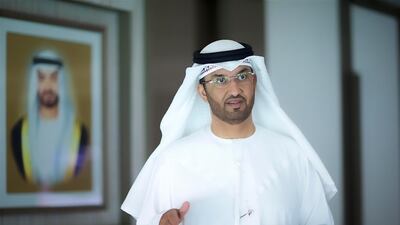Climate change is the most critical challenge facing the world today, apart from the Covid-19 pandemic, the UAE's minister of industry and advanced technology said.
Dr Sultan Al Jaber reiterated the country's commitment to lowering its emissions.
"As the world aims to lower its carbon footprint, the UAE will continue to lead as a responsible global citizen and we will leverage our convening power as a unifying force for progress," said Dr Al Jaber, who also serves as the country's special envoy for climate change.
He was addressing the annual Abu Dhabi Sustainability Week, which is taking place virtually because of the pandemic.
Pro-growth policies based on a diverse energy mix are needed to underpin a sustainable post-Covid economic recovery, added Dr Al Jaber.
He is chairman of Masdar, the UAE’s renewable energy company, and chief executive of Abu Dhabi National Oil Company.
Several institutions, including the Organisation for Economic Co-operation and Development, have urged world governments to incorporate green recovery programmes as part of their ongoing stimulus packages to revive their economies.
Governments around the world are being urged to align their economic recovery efforts with sustainable development initiatives.
The International Renewable Energy Agency estimates doubling annual global energy transition investments to $2 trillion over the next three years can boost global gross domestic product by 1 per cent.
The UAE, which accounts for 4.2 per cent of global production of oil, has pledged to cut its emissions by 23.5 per cent by 2030, from a 2016 baseline. The country, Opec's third-largest producer, is a significant player in global energy markets.
Dr Al Jaber stressed the importance of maintaining a balance between energy transition and meeting global supplies of energy in a low-cost, less carbon-intensive way.
"The UAE has a dual advantage: a leadership that has made environmental stewardship an integral part of our economy and a natural advantage that has made our oil and gas among the least carbon-intensive in the world," he said.
Adnoc, which accounts for nearly all of the UAE's oil and gas production, joined forces with industrial holding company ADQ and Mubadala, Abu Dhabi's strategic investment arm, to form an alliance to transform the country into a hub for hydrogen.
The alliance, formed on Sunday, aims to establish Abu Dhabi as a "trusted exporter of hydrogen to emerging international markets and build a substantial green hydrogen economy in the UAE".
Adnoc, which has set itself a target to reduce its carbon footprint by 25 per cent over the next 10 years, plans to produce blue hydrogen using its existing infrastructure.
Blue hydrogen is extracted from natural gas through a process called methane reformation, which relies on carbon capture and storage.
The increased focus on hydrogen was outlined in the company's $122 billion five-year spending plan, approved by Abu Dhabi's Supreme Petroleum Council in November.
Adnoc produces about 300,000 tonnes of hydrogen annually for use in its downstream operations. The company plans to expand its manufacturing capacity for the gas to more than 500,000 tonnes.


